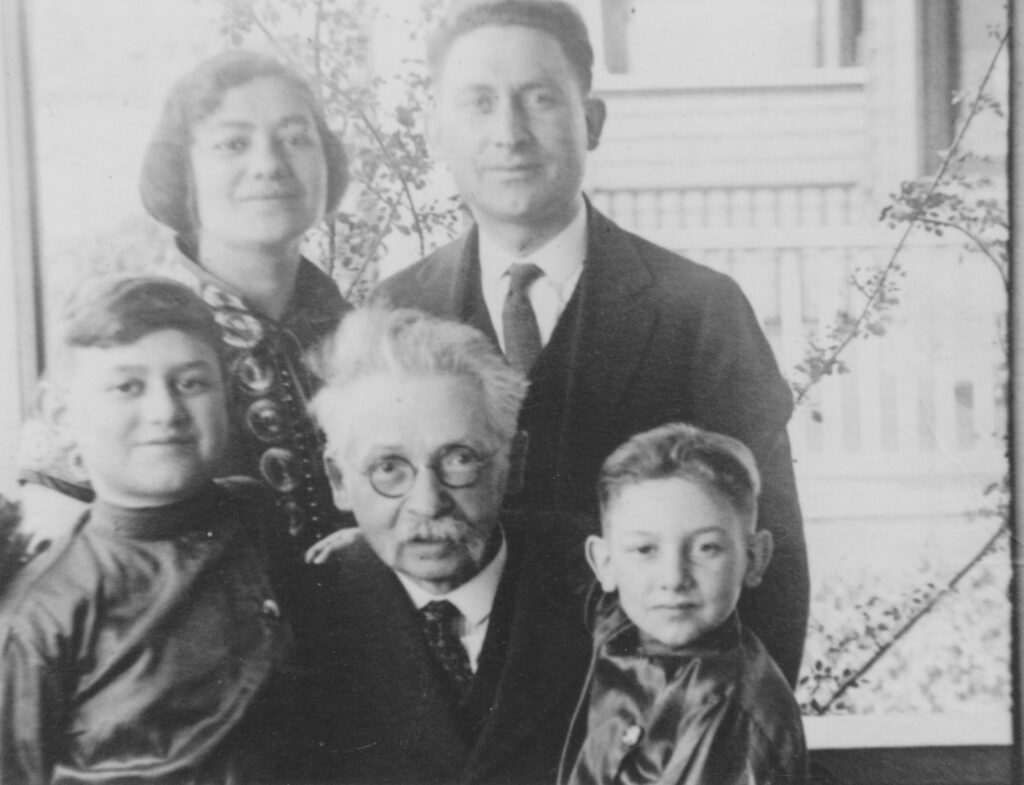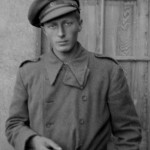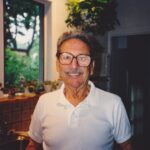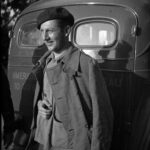Salud y Shalom: American Jewish Volunteers in Spain

Susman in 1922, perched on the lap of the poet Morris Winchevsky, the grandfather of Yiddish socialism.
Thirty years ago, I traveled around the United States equipped with a cheap tape recorder I spoke to 39 Jewish-American veterans of the Spanish Civil War. When they went to Spain in 1937, very few of the people I spoke to would have invoked their Jewishness for putting their lives on the line.
Nearly one-third of the Americans who went to Spain to defend the Republic during the Civil War were Jews. Comparable percentages describe the composition of all of the International Brigades in Spain. Thirty years ago, between 1992 and 1994, I traveled around the United States from New York to Florida, to Chicago, Los Angeles, San Francisco, and Seattle equipped with a cheap tape recorder, a stack of cassettes, and a list of addresses (and a modest subvention) provided by the Vets themselves. At that time,I spoke to 39 men and women. Their median age was 80.
The Cold War had officially ended with the dissolution of the Soviet Union in December of ’91. I spoke to men and women who had grown up with the Revolution of 1917. Some, in their childhood, had witnessed the Revolution first-hand; most were the children of immigrants from Czarist Russia; many of them were raised in a tradition of Jewish—and Yiddish-speaking—socialism before they joined the Communist Party in the 1930s. Nearly everyone I spoke to had left the Party long since, but this was the time for reckoning and reflection. We knew that there wasn’t much time.
When they went to Spain in 1937, very few of the people I spoke to would have invoked their Jewishness for putting their lives on the line. They were “internationalists”; they were “anti-Fascists.” Half a century after the fact they were not likely to revise the rationale for going to Spain, but given the chance to talk about their entire lives many were ready, as George Watt explained, to “come out of the closet”—as Jews. Watt had been moved recently by an exhibit at Yad Vashem, the Holocaust museum in Israel, to assert that Jews had resisted Hitler before the partisans of Vilna or the ghetto-fighters in Warsaw did so in the early ‘40s. What the members of the wartime resistance in Poland and Russia had in common with brigadistas in Spain were the movements that had animated their parents and grandparents in the Czar’s old empire. Immigrants from Eastern Europe brought that spirit to the Jewish enclaves of American cities.
George Watt, Bill Susman, Irv Weissman, Mike Bailin, and others were nurtured in the Yiddish, Socialist shuln—the secular equivalent of the Hebrew schools that trained other children in traditional piety. George Watt lit up with pride as he told the story of his grandfather, Avremele der lamden, Abraham the Learned One, who was a leader in the first strike of Jewish workers in the textile factories at Łodz in 1902. “It was part of our family tradition.” Bill Susman showed me a picture of himself as a boy in Bridgeport, Connecticut, perched on the lap of the poet Morris Winchevsky, the zeyde or “grandfather,” of Yiddish socialism. When Bill said, “I was born to go to Spain,” he was referring to a way of life that began before his birth and in another country.
Israel Kwatt (otherwise Kievkasky) went to Spain as George Watt and Bill Susman went as Bill Ellis as members of a Communist movement that encouraged its members to shed the ethnic distinctions that had defined their youth and, for many, their political orientation. “We wanted to hide our Jewish identity,” Watt explained, “and that was really in response to anti-Semitism, feeling that people would not follow us. . . . We sort of went into the closet. How do I say it? I was very much raised in a Jewish tradition, but I wasn´t the only one. That was the trend at the time. I feel bad about it at this time.” Abe Osheroff, who never changed his name, explained what he considered the ambivalence of the Party around what they always called “The Jewish Question”:
In practice [the Party] established a Yiddish newspaper and a few journals that were the instruments of the Communist Party, but in some ways, it was a two-faced policy. On the one hand it did everything it could to organize Jewish workers; on the other hand, there was a constant pressure on Jews in the Party, particularly those who were rising to leadership, to give in to the pressures of assimilationism, which the society in general was doing, because “Aby Osheroff” can’t work with the steelworkers.
The CPUSA had an “Americanization” policy of its own—with respect to its Jewish adherents, at least—that mimicked a common approach to patterns of immigration in the United States. At the same time, the “internationalism” of the Popular Front against Fascism set out to erode national, and thus nationalist, distinctions that might divide the Front. One result was to minimize the kind of distinctions that would emerge in our conversations half a century after the fact.
Currently, two friends—Tony Geist and Ed Baker—and I are preparing five Conversaciones for publication in Spain. George Watt, Celia Seborer, Ed Bender, Sana Goldblatt and Bill Susman. We derive our title, Salud y Shalom—familiar greetings in Spanish and in Hebrew or Yiddish—from the habitual valediction in letters that I received from another one of the Vets, Ed Lending. Ed had adapted an older formula—Salud y Victoria—that many of his comrades used in letters home from Spain and later from Europe and the Pacific where many of them served in World War II. By 1994 he wanted to accommodate his Jewishness (and his first language) in our discussion. And that, in the end, is where many of the Vets wanted to go; that is, we spoke not only of Spain but of entire lives, of parents and grandparents, the shtetl, the ghetto, the old neighborhoods and the aftermath. Salud y Shalom. Conversaciones con excombatientes judíos de la brigada Abraham Lincoln will return the excombatientes to Spain, in Spanish. In the next step we will add several names and bring them back to America, in English.
The excerpts printed here are from conversations with Israel Kwatt, previously Kievasky, who went to Spain as George Watt and with Bill Susman, who went as Bill Ellis. For both, the masquerade was thin. When George Watt wrote home to his parents from Spain, he wrote to them in Yiddish.
Joseph Butwin recently retired from the English Department at the University of Washington where he also taught courses on Jewish-American Literature and Culture in the Stroum Center for Jewish Studies. Selections of his interviews with Jewish Vets can currently be seen and heard on a website in Jewish Studies at the UW: https://jewishstudies.washington.edu/american-jews-spanish-civil-war/.
GEORGE WATT (1913-1994) Northport, Long Island. April 1992.
JB: I´d like to go back to what you call your own secular Jewish background.
GW: The most important influence on my life was my family values and education in the Jewish Socialist milieu. My father and mother both saw themselves as Socialists. He was a worker. He worked as a silversmith, jeweler and electro-plater; a metal polisher. He trained in the old country, I mean trained and apprenticed in Europe, in Poland. Łódz was our original city and we were raised in the tradition of Jewishness, but secular. In other words, they were atheists, both my parents were atheists although their parents—my mother’s side was pretty orthodox Jewish. My father’s also, my grandmothers were all religious Jews. But my father had already assimilated Socialist and atheist ideas even in Poland but was never very active. But here they read the Forvartz, The Jewish Daily Forward, and we saw ourselves as Socialists. Ever since I was a kid of six years old, I had visions of a beautiful world—brotherhood and sisterhood of man, no exploitation and peace and the workers living in a form of Utopia.
But there was something else in the family. As long as I can remember there was a legend in our family around my grandfather, my father’s father. My father’s father was a textile worker, a weaver, in Łódź and he worked in a factory which was owned by a Jewish boss. His factory was the place where they had the first strike of Jewish workers— Łódź—in 1902 at the Wiślicki factory in Łódź. And ever since I was a kid my father told a story which was part of our family tradition. He was not a rabbi, but he was considered very learned and was called Avremele der lamden, Abraham, the learned one, and he was one of the elder workers in the plant who became active in this strike and he was one of the leaders of the strike. Not the leader but one of the leaders. And my father always told this story and he said how they were arrested by the Tsarist police because this was Russian Poland then. And he described how he as a six-year-old boy watched his father being taken in shackles. The punishment in those days was they forced you to walk on foot back to your village of origin. See, many of the people living in Łódź had immigrated from the smaller outlying surrounding villages into Łódź where you had industry and they became workers and so on. And he had to move back to his home shtetl in kaytn, in chains. And this was the story I always remembered. And so that was part of our tradition. In other words, my grandfather, the pride that we had, my grandfather had led the first strike of Jewish workers in Łódź. 1902. That was around the time leading up to the 1905 revolution. So that’s part of our tradition.
George moved from Socialism to Communism in the early ‘30s, ceased to be a student at Brooklyn College in order to work full-time in the National Student Union where he was charged with channeling young recruits for Spain. And then he recruited himself.
BILL SUSMAN (1915-2003) Great Neck, Long Island. April 1992
Our home was always the place where speakers would stop and stay when they came to deliver speeches. I developed friendships with people like Zayde Winchevsky. I have a photograph of myself in my little Russian blouse, sitting on his lap with my Buster Brown haircut, corduroy pants. . . .
My father and mother were both charter members of the Worker’s Party of America which later went on to become the Communist Party. It was the first split from the Socialist Party on the issue of World War I. I was born in 1915. My recollection of the political world which starts about 5 or 6 years later—1921 perhaps, 1922—was that people would come to our house for meetings and they would engage in hot debates and arguments about who was right—Trotsky or Lenin or Bukharin whom I was convinced and persuaded were all Jews. After all, the reports about what they were saying came through in the Jewish press and they all seemed to speak Yiddish perfectly, so I was persuaded that they were all Jewish. And I was very pleased that there was a country where all the leaders were Jews! In any case, I used to listen to these discussions and I didn’t understand much of what was being said but I would pick out an idea here and there. Through this whole period, the picture of Eugene Victor Debs occupied the main spot in our living room and even though he was a Socialist my father felt very keenly that this was the kind of person that he should follow. . .
A number of people I’ve spoken to describe something very much like a conversion experience when they explain how they became a socialist or a communist. You know, suddenly they see the disaster of the system. Sacco and Vanzetti, the Depression. It slaps them in the face. Injustice. Eviction. A parent dying for want of medical care. From everything you’ve said, I don’t guess you ever had a conversion experience.
Never did. Other guys were indignant about what was happening in Spain. I was never indignant. I expected it. I thought well, of course, that’s how people are. And if you asked me why I went to Spain I would tell you I was born to go to Spain because with this background there was nothing else in my future but to do precisely that. I wouldn’t have been carrying out my program if I had not gotten involved.
What did what you call your “program” look like after you moved to New York? That would have been around 1929, in time for the Crash, right?
Well, I was involved. I became a Young Pioneer. I started in Bridgeport and continued in New York. Boys and girls together. Activities were the same on a younger level as the Young Communist League or the Young Workers League. When May Day came the Pioneers had the slogan, “Down with your Pencils on May First.”
After the Pioneers, Bill joined the Young Communist League, went to sea in 1934 to help organize the new National Maritime Union, then to Puerto Rico as an organizer for the Communist Party. He signed up to go the Spain while he was recruiting volunteers on the Island.















